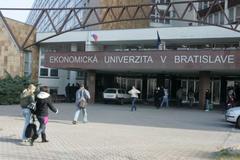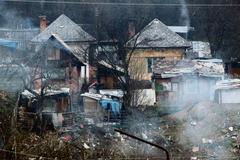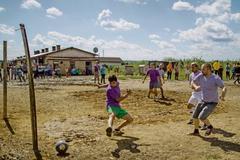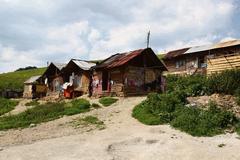Roma community, page 10
Roma Spirit 2014 awards granted
THE ASSOCIATION for Culture, Education and Communication (ACEC) granted the sixth annual Roma Spirit awards to individuals, a civic association, and a village for their contribution to the support and development of the Roma community.
Encouraging Roma study
SLOVAKIA needs more Roma with a university-level education, say participants in the “Even you have a chance” programme, which provides free courses, scholarships or extra lessons at the University of Economics in Bratislava (EUBA) for Roma wanting to study there.
NGO: Media present Roma in a stereotypical way
Some journalists still view Roma as a separate group and not as a part of Slovak society. This is the finding of the analysis elaborated by the Romano Kher – Rómsky dom (meaning Roma House) civic association in collaboration with the Newton Media agency.
Study: Employers avoid Roma
FIRMS are more interested in people who do not have typical Roma names, according to an experiment conducted by the Financial Policy Institute (IFP) of the Finance Ministry.
Welfare for Roma is not a fiscal issue, it's social
NOT even 2.2 percent of total public spending goes to Roma citizens even though they are often depicted as those who abuse the social welfare system in Slovakia. This is the finding from an analysis conducted by the Institute for Economic and Social Studies (INESS) released on October 22.
Report assesses Roma policies
THE POLICE raid of a Roma settlement in Moldava nad Bodvou, the government’s approach towards the activities of Slovakia’s Ombuds-woman, and introducing cuts in welfare benefits for those unwilling to participate in so-called activation work were steps taken by the government in 2013-2014 that were roundly criticised in a recent study released by the Milan Šimečka Foundation (NMŠ).
Moldava mayor talks Roma, cancelled concert
KOŠICE – Moldava nad Bodvou grabbed international headlines last year as the scene of alleged police violence targeting the Roma minority. In June 2013, an operation code named “Repressive-Search Action 100” saw 63 police officers raid the Budulovská Roma settlement on the outskirts of town. They were purportedly seeking seven men for whom they had arrest warrants. They found none of those men, but violence ensued and 15 other Roma were taken to the police station, and several were injured. No Roma were ever charged with a crime, and the incident drew criticism from the likes of the UN High Commissioner for Human Rights.
Busting the myth
WHENEVER economic hardship culminates people, tend to pick a scapegoat – a vessel to pour their frustration into. In Slovakia, the country’s 403,000-strong Roma population most frequently plays this unfortunate role. Whenever foreigners who haven’t been in contact with the Roma ask about this socially vulnerable group, many Slovaks readily offer their insights: instead of working, they sponge off the country’s social system, thus contributing to the country’s economic problems.
Human traffickers target Roma
ROMA living in segregated settlements become the most frequent victims of human trafficking in Slovakia. The most endangered groups are young people aged 16-25 and men aged 25-35, the study of the People in Need Slovakia humanitarian organisation showed.
Activists demolish part of Roma wall
A SHORT-LIVED hole appeared in one of Slovakia’s roughly dozen so-called anti-Roma walls in mid-September, once again raising awareness among the Slovak public of the existence of these walls.
Busting the Roma welfare myth
WITH the onset of economic crisis, popular myths about the burden unemployed Roma families place on the public budget took on epic proportions. Many such rumours suggest that Roma abuse the social benefits system by having many children, refusing to work, and boosting their incomes from state contributions – while making more money than many who are actually working. Statistical data and experts suggest these observations are not only discriminatory, but factually wrong.
- Ambulance hit by Russian drone goes on display in centre of Bratislava
- Bratislava’s embassy-backed events you don’t want to miss
- Slovak Matters: A flirtatious Easter of water and whipping
- “Return not,” the ocean cried. But I returned for her
- When to shop over Easter: Opening hours for supermarkets in Slovakia
- German shoemaker Lowa joins wave of factory closures in Slovakia
- The British Film Institute shines a light on Slovak cinema’s boldest chapter Video
- Why this gorge deserves a spot on your bucket list Photo
- Ambulance hit by Russian drone goes on display in centre of Bratislava
- Bratislava’s embassy-backed events you don’t want to miss
- “Return not,” the ocean cried. But I returned for her
- When to shop over Easter: Opening hours for supermarkets in Slovakia
- The British Film Institute shines a light on Slovak cinema’s boldest chapter Video
- US giant pulls plug on Slovak factory, axing 137 jobs
- Why this gorge deserves a spot on your bucket list Photo
- Slovak Matters: A flirtatious Easter of water and whipping
- Ambulance hit by Russian drone goes on display in centre of Bratislava
- “Return not,” the ocean cried. But I returned for her
- 3 free things to do in Bratislava in the next seven days
- The British Film Institute shines a light on Slovak cinema’s boldest chapter Video
- Bratislava’s embassy-backed events you don’t want to miss
- Slovakia's latest basketball star is destined for great things in the USA
- Weekend: What to make of Easter in Slovakia
- News digest: Finns air unseen video of Fico shooting, PM’s bloody jacket driven away by minister
- “Return not,” the ocean cried. But I returned for her
- German shoemaker Lowa joins wave of factory closures in Slovakia
- 3 free things to do in Bratislava in the next seven days
- Ambulance hit by Russian drone goes on display in centre of Bratislava
- US giant pulls plug on Slovak factory, axing 137 jobs
- When to shop over Easter: Opening hours for supermarkets in Slovakia
- Hundreds of people ousted from Bratislava’s Volkswagen
- Danish shoemaker to shut Slovak factory, axing 650 jobs in fresh blow to struggling region
- Slovakia mourns Pope Francis, a shepherd of hope and humility Photo
- Confetti, chants and history: Hejková’s dream goodbye after nearly 40 years at the top
- Slovakia’s public finances remain in deep trouble
- Ambulance hit by Russian drone goes on display in centre of Bratislava
- Why this gorge deserves a spot on your bucket list Photo
- The British Film Institute shines a light on Slovak cinema’s boldest chapter Video
- Bratislava’s embassy-backed events you don’t want to miss
- Water supply to be cut in parts of Bratislava’s Old Town in late April More articles ›






